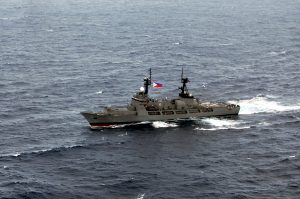President Rodrigo Duterte of the Philippines has taken an outspoken position on disputes in the South China Sea, describing a 2016 arbitral tribunal award that struck down virtually all of China’s claims in disputed waters as “beyond compromise.”
In a pre-recorded speech delivered to the opening of the 75th session of the General Assembly on September 22, Duterte reaffirmed the outcome of the case, which was issued by the Permanent Court of Arbitration (PCA) in The Hague.
“The award is now part of international law, beyond compromise and beyond the reach of passing governments to dilute, diminish, or abandon,” Duterte said in the speech, which followed an address by Chinese President Xi Jinping. “We firmly reject attempts to undermine it.”
The claim was filed with the PCA by the previous administration of President Benigno Aquino in 2013, following a lengthy stand-off with China over Scarborough Shoal, which ended with Beijing in effective control of the strategic reef.
In July 2016, the tribunal issued a ruling rejecting the legal basis for nearly all of China’s expansive maritime and territorial claims in the South China Sea. In particular, it determined that China’s “nine-dash line” maritime claim was inconsistent with the United Nations Convention on the Law of the Sea (UNCLOS), and that Beijing had violated the Philippines’ sovereign rights within the latter’s 200-nautical-mile Exclusive Economic Zone.
Duterte’s strongly worded speech, filled with references to “the majesty of the law,” represents an abrupt reversal of his initial reaction to the ruling, which was handed down shortly after he took office in 2016. Downplaying the legal victory, he opened direct talks with President Xi, hoping to tap Beijing for badly needed infrastructure funding.
It also reflects a broader hardening of the Philippines’ position on the maritime disputes. In July, the fourth anniversary of the issuance of the award, the Philippines Department of Foreign Affairs issued a statement acknowledging it officially for the first time. In the statement, Foreign Affairs Secretary Teodoro Locsin described it as being “of great significance and consequence to the peaceful settlement of disputes in the South China Sea and to the peace and stability of the region at large.”
On September 21, Locsin augmented this by affirming that any Code of Conduct negotiated with China would ensure a continued Western presence in the South China Sea. “I can swear to you, Western powers will be in the South China Sea,” he told lawmakers in Manila. “We believe in the balance of power, that the freedom of the Filipino people depends on the balance of power in the South China Sea.”
The strengthening of the Philippine line has been paralleled by an increasing international alignment behind the arbitral award. On July 13, U.S. Secretary of State Mike Pompeo announced an important shift in U.S. policy on the South China Sea. The policy essentially aligned the U.S. position with the PCA ruling, and for the first time described specific Chinese maritime claims as “illegal” under UNCLOS, although the U.S. is yet to ratify the treaty.
In the months since, other Western powers including France, Germany and the United Kingdom have all voiced their support for the ruling, along similar lines to the U.S. In his speech to the U.N., Duterte welcomed “the increasing number of states that have come in support of the award and what it stands for – the triumph of reason over rashness, of law over disorder, of amity over ambition.”
One could hardly ask for a more forthright statement of principle. But given the Philippine president’s mercurial political style, and his habit of freelancing on foreign policy questions, his comments always come with an asterisk attached.
Since his initial soft-pedaling of the PCA’s arbitral award, Duterte has been highly inconsistent on the question of the South China Sea. He has veered between macho posturing and mellifluous praise of China and President Xi, breaking frequently with the Department of Foreign Affairs, which has tried in vain to maintain a consistent line on the maritime disputes.
It is not inconceivable that as Duterte nears the end of his presidential term in 2022, he might once again lean on China to deliver a big-ticket infrastructure deal that helps boost his chosen successor (perhaps his daughter, Sara Duterte-Carpio) to office
As such, it remains to be seen whether this marks a permanent policy shift for the Philippines, or merely the next step in the Duterte administration’s slightly drunken dance between the two superpowers.

































